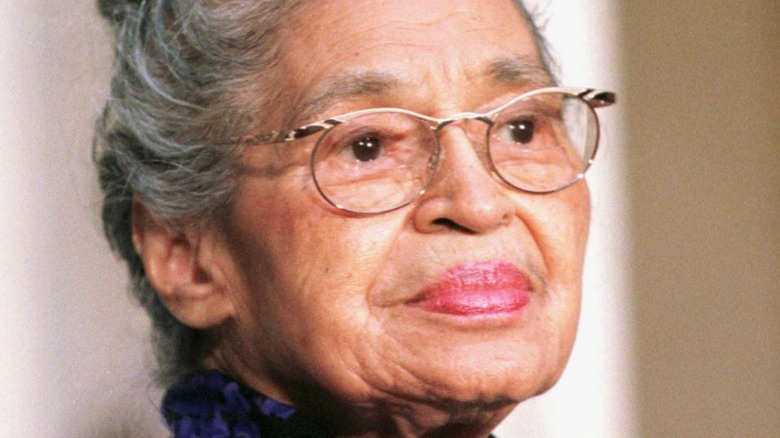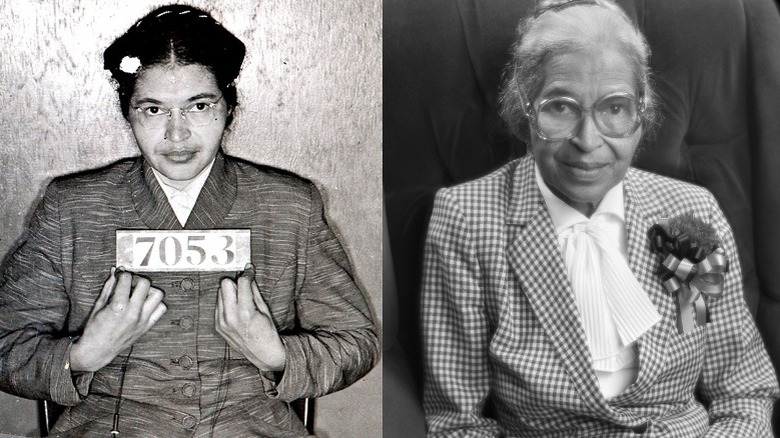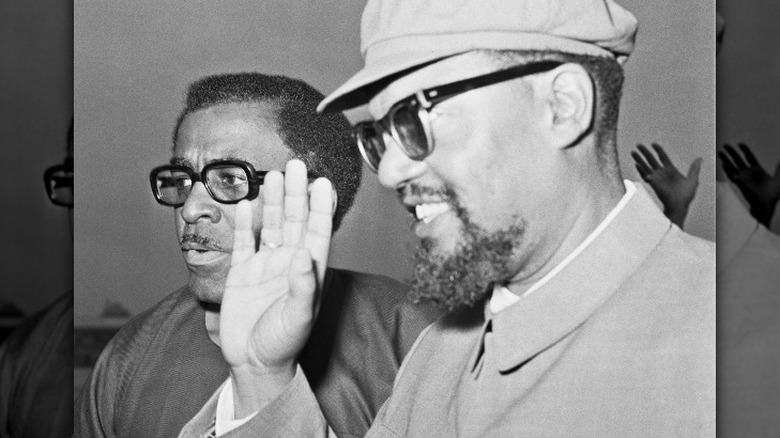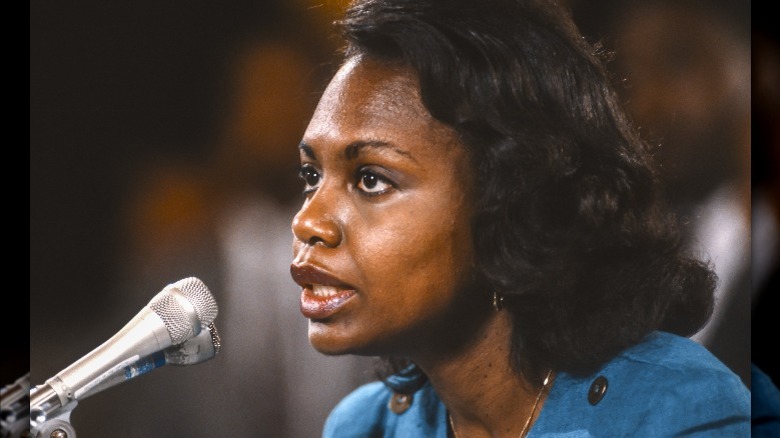Rosa Parks' Brutally Honest Words On Clarence Thomas' Supreme Court Nomination
Update: A prior version of this article indicated Judith Butler authored "The Feminine Mystique," but it was written by Betty Friedan. We have removed the reference to the book completely, as the passage is about Judith Butler and not the book itself.
You've probably heard the name "Clarence Thomas" in some headlines lately. Since the reversal of the landmark 1973 Roe v. Wade decision, millions of Americans have lost faith in the nine justices in Washington, D.C. (via Gallup). The Supreme Court has the final word on American law: its decisions set the course of the world we will live in for the next few decades (often longer). One Supreme Court justice who spoke out vocally in support of the reversal, as you may already be aware, is a man named Clarence Thomas (via Newsweek).
It's not the first time he's been the target of outrage and grief. Long before the recent ruling and Thomas' return to the unforgiving glare of the spotlight, he's been the target of outcry from his peers, from women, and from those who fought fiercely for Black civil rights. With the exception of perhaps only Martin Luther King Jr. and Malcolm X, there is perhaps no civil rights hero more revered and more universally adored than one — Rosa Parks — and she spoke out against Thomas back in 1991.
'I believe Judge Thomas will ... be destructive for our nation'
Civil rights icon Rosa Parks had words for Clarence Thomas before it was cool: Back on September 13, 1991, she wrote a letter predicting he would be detrimental to civil rights in the United States. It's recently resurfaced on Twitter (via Jeanne Theoharis/Chicago Defender), earning more than 73,000 likes. It rings with her usual eloquence, her prose emanating with both grief and the love for humanity that inspires that grief. Her words are always worth reading.
A month before his confirmation (per Chicago Defender), civil rights icon Rosa Parks warned of the threat she believed Thomas posed to justice. With prescience, she spoke with alarm on Thomas' legacy of hostile stances on civil rights. "His statements on Brown v. Board of Education case... and even on the Roe v. Wade to me indicate that he wants to push the clock back," Parks wrote in the letter, now preserved by the Library of Congress. "The Supreme Court now appears to be turning its back on the undeniable fact of discrimination and exclusion ... I believe that Judge Thomas will accelerate that trend and that will be destructive for our nation."
The NAACP and Judith Butler also oppose(d) Clarence Thomas
Rosa Parks is not the only American giant of ideology that has spoken out against Thomas. Judith Butler, a well-known philosopher and gender theorist, also spoke on Clarence Thomas after the recent Dobbs ruling in a piece published by Verso Books. "Activists in the reproductive rights movements have known about this threat for some time, and Thomas simply now carries the torch that has been passed to him by conservative evangelicals ... In Planned Parenthood v. Casey (1992), previous Supreme Court made clear that it thought Roe v. Wade was decided on illegitimate grounds," Butler wrote in June 2022.
The NAACP was also opposed to Thomas' nomination to the Supreme Court in a 49-1 vote in 1991, primarily citing his stance on affirmative action (via The Black Scholar). "We have concluded that Judge Thomas's confirmation would be inimical to the best interests of African Americans," the NAACP said in a statement. Benjamin Hooks said the decision was made with "neither joy nor haste." He continued in "On The Matter of Clarence Thomas": "We have found Judge Thomas to hold inconsistent views on civil rights policies. We are not willing to risk his going on the Court as a member of the increasingly radically conservative right."
Clarence Thomas: A Controversial Legacy for the 'Anti-Thurgood Marshall'
Before Clarence Thomas was ever confirmed to the Supreme Court, his legacy was already marred by an unrelated controversy. In the George H.W. Bush nominee's confirmation hearing before the Senate, Anita Hill (pictured) testified that Thomas had sexually assaulted her, electrifying headlines nationwide. He was confirmed anyway by a 52-48 vote on October 23, 1991 (according to the Chicago Defender).
Clarence Thomas' record of both comments and decisions (found via OnTheIssues) includes a lengthy history of opposition to LGBTQ+ rights, opposition to affirmative action, and some controversial views on race. Elsewhere, he has faced scrutiny for his wife's alleged involvement in the January 6, 2021 attack on the United States Capitol (via Vanity Fair). Barring resignation, he will serve on the Supreme Court until death.
If you or anyone you know has been a victim of sexual assault, help is available. Visit the Rape, Abuse & Incest National Network website or contact RAINN's National Helpline at 1-800-656-HOPE (4673).



